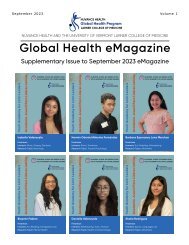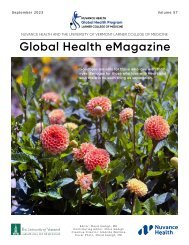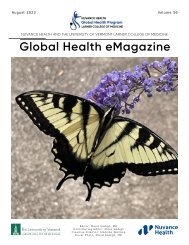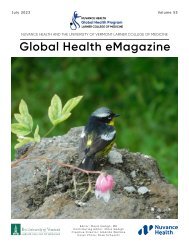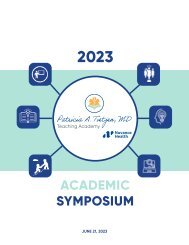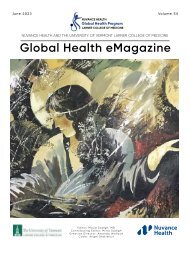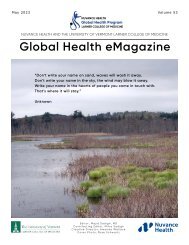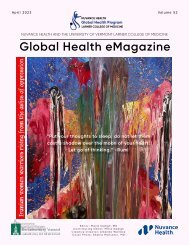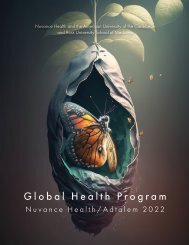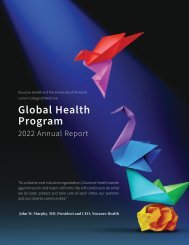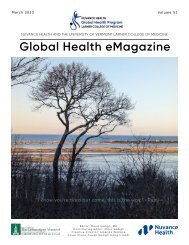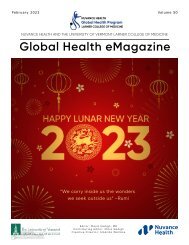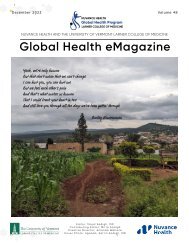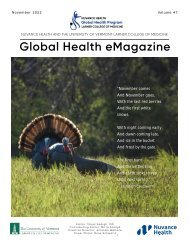eMagazine January 2023
You also want an ePaper? Increase the reach of your titles
YUMPU automatically turns print PDFs into web optimized ePapers that Google loves.
OUR PEOPLE,<br />
OUR MISSION<br />
Global Health<br />
<strong>eMagazine</strong><br />
<strong>January</strong> <strong>2023</strong><br />
Perspective<br />
Highlights<br />
Reflections<br />
Innovation and Technology<br />
Section Editor:<br />
Nursing Division<br />
Catherine G Winkler, PhD, MPH, APRN-BC<br />
Director of the Nuvance Health Global Health Program Nursing Division<br />
An Aging Population Across the World<br />
and Senior Care: Part 2<br />
Written by<br />
Catherine G Winkler, PhD, MPH, APRN-BC<br />
Director of the Nuvance Health Global Health<br />
Program Nursing Division<br />
Nursing Division<br />
Women’s Health Education<br />
Global Local<br />
Art to Remind Us of Who<br />
We Can Be<br />
Article of the Month<br />
Video of the Month<br />
Our Beautiful Planet<br />
Welcome<br />
Congratulations<br />
Among the Letters<br />
Global Health Family<br />
Calendar<br />
Photo News<br />
Photo Gallery<br />
Resources<br />
As populations age, countries will need to continue to assess and weave elders<br />
into the fabric of society at much higher numbers to meet the needs of older<br />
persons as well as to utilize their skills and knowledge to ensure that there<br />
are efficient, cost-effective approaches to achieving societal balance across<br />
all age groups. Some countries have begun innovative programs or modified<br />
existing ones to promote infrastructure changes that support public services<br />
for elderly persons while concurrently adding benefits to society. Japan, which<br />
is the world’s oldest county, instituted caring relationship tickets or currency<br />
to encourage volunteer services for elders by younger folks that then can be<br />
later used to support their own older family members. Further, education on<br />
dementia has been provided with some communities instituting wellness checks,<br />
QR codes in elders’ clothing to help identify a senior who might have wandered,<br />
and cafes who cater to elders with forgetfulness or dementia. Other countries<br />
such as Germany have shared apartments where eight roommates who all have<br />
dementia can live, learn, and share responsibilities within a home with 24-hour<br />
nursing care. Additionally, in China where nursing homes are uncommon, the<br />
government continues to support the notion that 90% of the elderly population<br />
receives support and care from family with 6% at the community level with elder<br />
centers and 4% at nursing homes. This is a challenge with fewer young people<br />
who can serve as caregivers due to the one-child rule that has since been lifted<br />
along with many young people moving from rural homes to the urban setting to<br />
work, leaving seniors alone. China has started a University of the Aged to provide<br />
education and a sense of connection for those who attend and a Silver College<br />
with cultural activities.<br />
Here in North America, nursing homes (extended care facilities) and short-term<br />
rehabilitation facilities have been common for several years. Currently, 1.5 million<br />
Americans reside in nursing homes (Stats., 2022) with projections citing that more<br />
than 70% of people in the U.S. will require long-term care (Stats, 2022). However,<br />
others believe that the need for nursing homes will decrease in the future due<br />
to alternatives in elder care management such as assisted living, while others<br />
believe that with an increase incidence in dementia and many skilled facilities<br />
closing during the pandemic (estimated 300) with another 400 pending per<br />
Becker’s Review (2022) it is difficult to predict.<br />
18




